#If Hal had more time with Richard he might not have been as prepared for the politics and being the 'perfect' king
Explore tagged Tumblr posts
Note
I'm sorry for inflicting Ian Mortimer on you but I found a thing from his introduction in his Henry IV bio that's like. deranged.


Nevermind the speculation about Richard setting the Lancastrian inheritance on Hal, Richard will be inevitably usurped!!!! And then we'd truly see what a failboat loser Henry V was and how Henry "David Beckham+Winston Churchill but better" IV is truly the great man in history!!!
Me reading this like

Breaking it down:
Just from the first line: why does he make Henry so petty oh my gosh.
Also no, just asking if things would have turned out differently if their roles were reversed does not automatically imply they were the same competency level.
Is it because I mostly look at 1413 through the lense of what was happening with Hal, or was the country really not that stable? A lot of the problems Henry V had in his early reign (i.e. the French, the Lollards, partially Southampton) were just carry overs from his father's reign. And a lot of the political factions that were dueling in Henry IV's reign either left or were fired at the start of Henry V's. That was either Hal cleaning house or Henry IV's supporters essentially leaving en masse, which doesn't suggest a whole lot of stability. And again, a lot of the credit for settling the Welsh rebellion is given to Hal, not Henry.
Why would Hal have usurped Richard though? Why is that inevitable? Richard could have adopted Hal instead, we don't know! And yeah, I was thinking that-- even if it wasn't the Duchy of Lancaster, Richard was trying to arrange Hal's marriage to a Valois, and I highly doubt the French would have allowed their princess to be married off to someone without a Duchy at minimum.
(The mental image of Richard taking the Duchy of Lancaster from Henry and giving it to Hal is hilarious though).
Also, as far as I can tell the Welsh rebellion had nothing to do with who was king (though it was probably taken as a good time to strike), so really wouldn't it have been Richard's problem? And the Scottish border was always an issue, even if it did get worse under Henry's reign. The French might not have been a problem at all for Hal if Richard had lived long enough to arrange Hal's marriage. Most of all, a lot of the Ricardians seem to have ended up on Hal's side, and he essentially had to deal with a repeat of the Epiphany plot with Southampton, so...
#Henry V#Henry IV#Mortimer Problems#Really wouldn't the argument be that Hal would have been a very different king without all the trauma#So yes he probably would have been quite a different ruler if he took over in different circumstances#Maybe not that different seeing as don't have much surviving about his personality when he was young but still#So Henry does get some credit :)#If Hal had more time with Richard he might not have been as prepared for the politics and being the 'perfect' king#So he would have had more problems#(this is all joking btw)#But I do genuinely wonder why Mortimer thinks Hal would have inevitably usurped Richard?#Maybe someone else would have!#But does he think that Hal is just noble enough to avenge his father's honour#or does he think Hal is so power hungry he would steal it from Richard eventually#Legit I want to know
9 notes
·
View notes
Text
WHO’S QUITTING!
July 31, 1954

The July 31, 1954 issue of TV Guide (volume 2; number 31) featured actor William Bendix on the cover with the headline: “Who’s Quitting! Say Lucy and Desi”.
The last day of the listings in this Guide is August 6, 1954, Lucille Ball’s 43rd birthday!
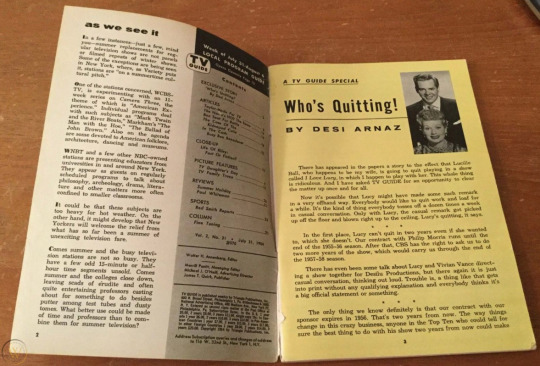
The inside article is by Desi Arnaz, who takes the opportunity to correct the rumor that they are quitting their hit show, “I Love Lucy,” then preparing its fourth season. Desi reports that Lucy’s casual remark that she’d ‘like’ to quit was rhetorical and not based in reality. In fact, they were contractually obliged to Philip Morris (their sponsor) to continue until 1956. After that, CBS had the right to ask for two further seasons, taking the couple to 1958. Desi mentions that there had been some casual talk about Lucy and Vivian Vance directing a project together for Desilu. [Such a project never came to pass.] He states that by the end of their contract that they will have done 175 films. [In fact, they did 179, not including filming the “Christmas Special”, new intros for re-runs, and the unaired pilot.]
Desi predicts that they may do monthly hour-long specials, several years in advance of “The Lucy-Desi Comedy Hours”, proving that even by mid-1954, the idea of cutting back their hectic schedule was discussed. Desi even theorizes that they might go fishing in Cuba! [All travel to Cuba would be stopped by the end of the 1950s.] One thing that Desi makes very clear is to dispel the rumor that “I Love Lucy” may go on with another actress in the role of Lucy Ricardo.
“There will never be an ‘I Love Lucy’ without Lucille Ball. Period. Exclamation point!”
TV Guide’s headline is slightly misleading by the use of the exclamation point. It should actually read “Who’s Quitting?” which is essentially what Desi is wondering. You can almost hear it spoken in his Cuban accent! In all fairness to TV Guide, summer was devoid of new programming and TV Guide was looking to sell magazines by putting provocative headlines and images about top shows on the cover. This no doubt increased sales, even if there was nothing to watch.
ABOUT THE COVER:
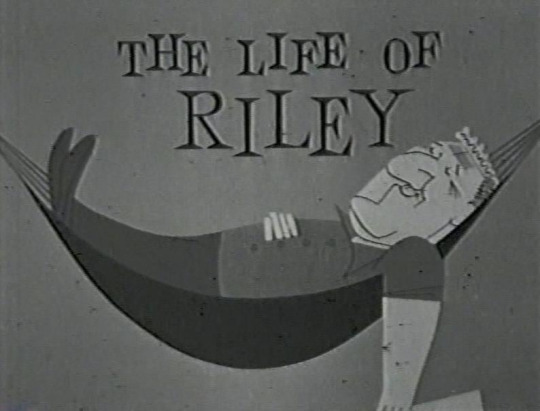
William Bendix was then starring in the NBC sitcom “The Life of Riley”. First heard on radio starring William Bendix, the series moved to TV in 1948 starring Jackie Gleason in the title role. It lasted until 1950. In 1953, the series returned with it’s original radio star (and the lead of its film version), William Bendix. At the time this TV Guide was issued, the series had just finished its second season and was readying its third (of six).

The show regularly featured two “I Love Lucy” players, Gloria Blondell (Honeybee) and Herb Vigran (Muley). Blondell played Grace Foster in “The Anniversary Present” (ILL S2;E3) in 1952 and Herb Vigran played various “Lucy” characters like Jule, Joe, and Hal Sparks.

Other actors who showed up on both “Lucy” and “Riley”: Mary Jane Croft, Richard Deacon, Vivi Janis, George O’Hanlon, Nancy Kulp, Dayton Lummis, James Burke, Florence Lake, Mary Ellen Kay, Benny Rubin, Ray Kellogg, Howard McNear, Norman Leavitt, Pierre Watkin, and Bobby Jellison.
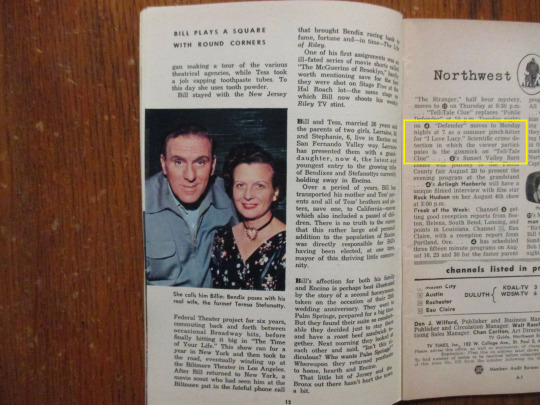
From the Northeast Edition, a mention of “Public Defender” being moved to “I Love Lucy’s” time-slot for the summer. The episode listed in this edition featured “I Love Lucy’s” Madge Blake.
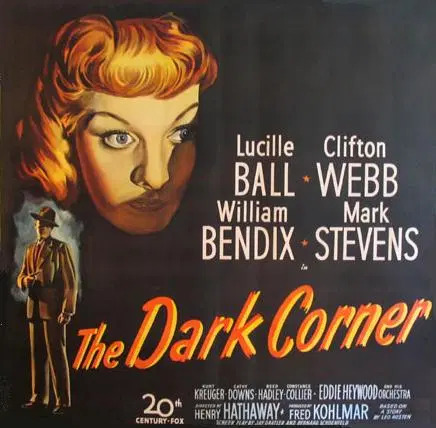
In 1946 Lucille Ball and William Bendix appeared together in the film The Dark Corner.
INSIDE THE ISSUE:

Photo feature of TV starlets Natalie Wood, Lauren Chapin, Sheilah James, Eleanor Donahue, and Elena Verdugo in swimsuits at the beach!
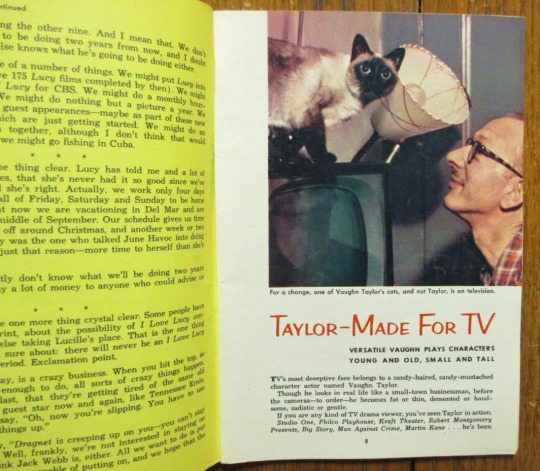
Feature on character actor Vaughn Taylor and his cats

Photo feature on the Truex family of actors. Ernest Truex had appeared with Lucille Ball in Dance, Girl, Dance (1940).
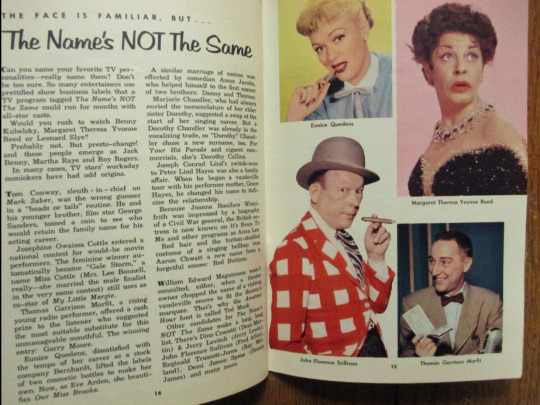
Photo feature on the real names of favorite stars. Included is Eunice Mary Quedens (aka Eve Arden) who played herself in “Hollywood at Last!” (ILL S4;E16).
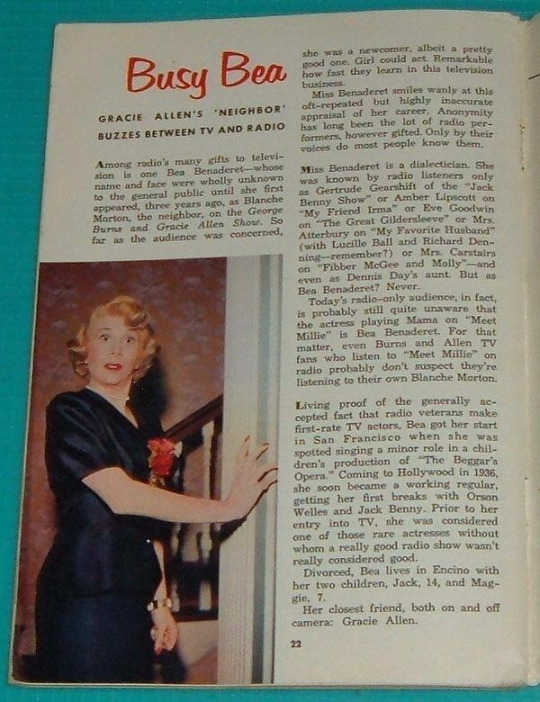
Profile on TV favorite Bea Benaderet. Benadaret had co-starred with Lucille Ball on “My Favorite Husband” and was her first pick for the role of Ethel Mertz. She played spinster Miss Lewis on “I Love Lucy.”
For More About TV Guide and “I Love Lucy” Click Here!
#TV Guide#Lucille Ball#Desi Arnaz#I Love Lucy#Bea Bendaret#Eve Arden#TV#Ernest Truex#Vaughn Taylor#The Dark Corner#William Bendix#The Life of Riley#Gloria Blondell#Herb Vigran#Public Defender#1954
5 notes
·
View notes
Photo
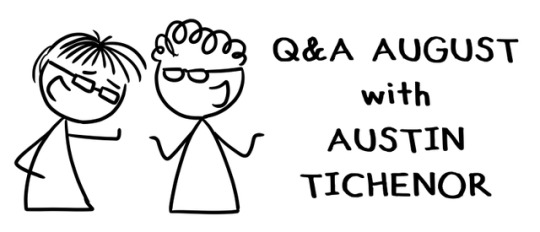
Q&A August: Austin Tichenor of the Reduced Shakespeare Company
They say you should never meet your heroes, but obviously “they” were never enlightened enough to consider Austin Tichenor of the Reduced Shakespeare Company a hero. Like many Shakespeare geeks, I was exposed to Reduced Shakespeare Company’s performance of The Complete Works of William Shakespeare (abridged) at an impressionable young age. Once the DVD came out, I watched it over and over again, soaking up the irreverence and affection for Shakespeare like a sponge. It never occurred to me that I would one day meet the curly-haired pompous idiot in the black pants whose antics had entertained me so much, let alone be lucky enough to call him a friend, but that’s exactly what has happened.
I first met Austin (after exchanging mutually admiring tweets with him) in April of 2016, during their world premiere of William Shakespeare’s Long Lost First Play (abridged) at the Folger Library. I was prepared to be utterly starstruck, but Austin was so wonderfully down-to-earth that within minutes I felt like I’d known him forever. Totally lacking the pomposity and idiocy of his stage persona, Austin was overwhelmingly encouraging and supportive of my work, immediately welcoming me to play with him in the Shakespeare comedy sandbox. I had literally just started working full-time on Good Tickle Brain, so his enthusiasm meant the world to me.
I could gush about Austin for many more paragraphs, but I’m sure you’d rather hear from him, so here he is, my Comedy Fairy Godfather, in his own words!
1. Who are you? Why Shakespeare?
I’m Austin Tichenor, a playwright, director, and actor. I'm the co-artistic director of the Reduced Shakespeare Company, a three-person comic theatre troupe that reduces long serious topics into short silly comedies.
My first exposure to Shakespeare was undoubtedly in the original series of Star Trek! I read Shakespeare in high school English classes and got to see fantastic productions of Shakespeare at American Conservatory Theatre in San Francisco and the Berkeley Reprtory Theatre, but I didn’t get to actually WORK on Shakespeare until grad school where I both played Claudius in a production of Hamlet and reduced my first Shakespeare (it was a directorial exercise: a five minute reduction of Much Ado About Nothing). My first professional theatre job was creating plays for young people so I went to Shakespeare immediately, creating 45 minute cuttings of Much Ado, Midsummer, and The Tempest.
So the opportunity to join the RSC in 1992 and perform its signature work The Complete Works of William Shakespeare (abridged) (written by the RSC’s founders) in London’s West End for eight months combined all my theatrical loves: smart silly comedy, non-realistic theatricality, and Shakespeare — which is kinda redundant, now that I think about it
2. What moment(s) in Shakespeare always make you laugh?
My favorite moments are typically when characters make incredible discoveries about themselves, and these are usually comic. Malvolio’s “I am…happy!” Terrible actor Francis Flute fully committing to the moment on “Dead, my dove?” Benedick’s “There’s a double meaning in that.” Hamlet toying with Rosencrantz and Guildenstern, or telling Claudius he “shall nose” the dead Polonius as he goes upstairs. Olivia’s “Most wonderful!” when the penny drops and she realizes “Cesario” is actually Viola (and Sebastian’s twin).
3. What's a favorite Shakespearean performance anecdote?
I have two!
1) We were performing William Shakespeare’s Long Lost First Play (abridged) for the Shakespeare Theatre Association conference — the savviest and most knowledgeable group of people I’ll probably ever perform for, ever. I was playing Richard III and limping downstage to say my first line, one of the most famous first lines in all of Shakespeare. But I was distracted because I saw there were people sitting on the sides and I didn’t want to limp too far downstage for them to see — and in my distraction I said, “Now is the moment of our...” As soon as the word was out of my mouth, I knew I’d blown the line (it’s supposed to be “Now is the winter of our discontent”) and I knew I couldn’t pretend that it hadn’t happened; not in front of that crowd, not in our style of show. So I quite audibly said, “Oh f&$# me,” and limped back offstage to come in again. This time I said the line right and emphasized the first word: “Now is the winter of our discontent!” It brought down the house and everyone asked whether I’d planned it. Sigh…no, I hadn’t.
Mya interjects: I was in the house for this performance and this moment remains one of the highlights of my theatre-going career. What Austin neglects to mention here is that Reed, who had been left alone onstage after Austin had retreated, went over to the wings as if to confer with Austin, and said, sotto voce, “No, I don’t think anybody noticed.”
2) We were performing The Complete Works on a stage that had a little runway that circled the orchestra pit. In one of the scenes, Adam Long (one of the RSC’s founding members) decided to hop over the pit, from the stage to the runway, and he ended breaking the runway floor and falling through the boards. Thankfully uninjured, and delighted that he had this opportunity, he immediately uttered the immortal words, “Don’t worry, it’s just a stage I’m going through."
4. What's one of the more unusual Shakespearean interpretations you've either seen or would like to see?
I’m glad that nowhere in here have you asked what my favorite play is. I don’t have favorite Shakespeare plays, but I do have favorite productions. Here are two:
1) The Folger Theatre at the Folger Shakespeare Library in Washington DC’s production of Love’s Labor’s Lost was delightful from start to finish: Incredibly smart, wildly funny, and wonderfully charming. The director and her team made the King’s desire for “a little academe” quite literal by re-creating the Folger Library’s handsome reading room onstage. (I wrote about this terrific production here.)
2) The Chicago Shakespeare Company production of The Tempest, co-directed by Aaron Posner and the magician Teller, turned Prospero into an actual wizard and filled the production with literal magic. (There must have been magic in Shakespeare’s original production as the First Folio has a stage direction that mentions that characters disappear by means of “a quaint device���. Teller filled his production with many quaint magic tricks and devices!) With music by Tom Waits and great comedy from its clowns, it was the most entertaining and completely realized production of The Tempest I've ever seen.
Favorite moments?
When Henry IV (Jeremy Irons) slaps his snotty son Prince Hal (Tom Hiddleston) in The Hollow Crown adaptation of Henry IV, Part 1 taking him (and the audience) by total surprise.
When Francis Flute’s (Sam Rockwell) emotions bubble to the surface unexpectedly in the ridiculous “Pyramus and Thisbe” in the film version of Midsummer.
When Juliet (Claire Danes) stirs and almost wakes up in time to prevent Romeo (Leonardo DiCaprio) from killing himself in Baz Lurhmann’s Romeo + Juliet.
When Antigonus (Gregory Linington) distracted the Bear, dooming himself but preventing the death of Perdita, in the Goodman Theatre production of one of my least favorite plays The Winter’s Tale.
5. What's one of your favorite Shakespearean "hidden gems”?
The hidden gem of Shakespeare is actually right out in the open: He’s written incredibly theatrical plays, filled with rich and elusive characters that still fascinate us 400 years later, and even the most serious of his plays (including his Histories and especially his Tragedies) contain more comedy than is generally realized (or pulled off). Shakespeare was a showman whose livelihood depended on entertaining his audiences, so he created plays filled with music, devices, comic bits, fascinating characters, time jumps, changing perspectives, and shifting tones that are always serious (especially his Comedies) but never solemn.
(You don’t ask what my Shakespearean pet peeve but here it is: Productions that lack urgency and ignore the above, as in: Comedies that are beautiful-looking and melancholy but not funny. Histories that ignore the comic chaos that Shakespeare layers in. Tragedies that are one-note, over-the-top, and not in any way believable. Romances that equate pastoral with languid and not compelling. Argh.)
6. What passages from Shakespeare have stayed with you?
Oh so many...
Beatrice’s “Kill Claudio,” which comes seemingly out of the blue and yet is so right.
Falstaff’s honor speech, when done right, in front of a live audience.
And I find Miranda’s “O brave new world that hath such people in’t” just incredibly moving. (I’m always moved by Joy. Tragedy can suck it.)
Mya interjects: “Tragedy can suck it” might be my new personal motto now. Thanks, Austin.
7. What Shakespeare plays have changed for you?
Henry VI, Part 1. Reading it again recently, I was struck by the level of chaos Shakespeare depicts in a kingdom struggling without a ruler. It’s almost like Monty Python meets Veep: Sentences can’t get finished because people are running in and out, declaring “I’m in charge! I’m in charge!” with grand impotence. Of course Shakespeare would write it like that: He needed to entertain his audience, who were probably also nervous about their aging queen who had yet to declare a successor. Shakespeare created a chaotic warning that England shouldn’t descend into that kind of comically dangerous madness again — a warning that wasn’t really heeded, unfortunately.
8. What Shakespearean character or characters do you identify the most with?
Having played so many of them (albeit in reduced forms), that’s a tough call. But because I’m also an actor and a playwright, the ones I probably identify with the most are Shakespeare's seemingly autobiographical ones: Peter Quince, the only (I think) actor-playwright in the canon. Hamlet, the Danish prince with surprisingly strong opinions about theatre’s power and how certain speeches should be played (and how annoying comedians can be). Benedick, who struggles with his writing so comically. Suffolk, who in Henry VI, Part 1 declares, “I’ll call for pen and ink and write my mind.” And Bottom, of course, who thinks he can play anything.
Mya interjects: PETER QUINCES OF THE WORLD, UNITE!
9. Where can we find out more about you? Are there any projects/events you would like us to check out?
I’ve spent the last several years doing incredibly deep dives into Shakespeare, across many media:
My RSC partner Reed Martin and I wrote Pop-Up Shakespeare, an incredibly fun (and useful) introduction to the Bard’s life and works with beautiful, amazing, and funny illustrations by Jennie Maizels.
I contribute monthly essays about the intersection between Shakespeare and popular culture for the Folger Shakespeare Library’s Shakespeare & Beyond blog.
My weekly podcast (now in its 13th year) is a backstage glimpse into the life and works of the Reduced Shakespeare Company, featuring interviews with our many comedian, actor, playwright, author, director, composer, dramaturg, and artist friends and many many deep dives into matters Shakespearean.
Reed and I also wrote the definitive irreverent reference book, Reduced Shakespeare: The Complete Guide for the Attention-Impaired (abridged), which is still inexplicably in print (perhaps cuz it’s definitive).
We also wrote the stage play William Shakespeare’s Long Lost First Play (abridged) (“An absolute resolute hoot of a bawdy comedy of errors!” Broadway World), which premiered at the Folger Theatre in 2016, has toured the US and the UK, and is available for licensing via Broadway Play Publishing.
And in November 2019, the RSC will perform the international premiere in Israel of our brand new script Hamlet’s Big Adventure (a prequel) — what would happen if Tom Stoppard wrote Muppet Babies. It’s the comedy of the Prince of Denmark!
If after reading all this, for some insane reason you still want to get in touch, come find me here on Twitter. I think Mya will agree that it’s a much more civilized and fun place than its reputation suggests.
(Back to Mya) Thanks so much to Austin for taking the time to answer my questions! If you want to HEAR us actually talking to each other check out:
Reduced Shakespeare Co. Podcast #493
Reduced Shakespeare Co. Podcast #532
Reduced Shakespeare Co. Podcast #653
Q&A August continues next week with two phenomenal women who are using Shakespeare to build the most amazing things.
40 notes
·
View notes
Text
Sssssss (1973) SUMMARY Dr. Carl Stoner (Martin), a herpetologist, sells a mysterious creature in a crate to a carnival owner. He later hires college student David Blake (Benedict) as an assistant, claiming that his previous assistant had left town to attend to a sick relative). Unbeknownst to David or anyone else, Stoner is a delusional man, convinced that humanity is doomed and is attempting to prepare for what he believes to be the inevitable by working out a method of transforming humans into reptiles that can survive pollution and any other ecological disaster that would wipe humanity out.
Stoner begins David on a course of injections, purportedly as a safeguard against being bitten by a snake in his lab. David’s skin slowly starts to change and even peel like a snakeskin. He begins to have strange nightmares and goes into a coma when having dinner with Stoner and does not wake up until a few days later. He also begins to lose weight as well, but Stoner tells him those are side effects from the venom. David begins a romance with Stoner’s daughter Kristina (Menzies), although her father objects and insists that she not have any sexual relations with him.

When David wakes up the next morning, he looks in the mirror and screams in horror. Later, a distraught David is in the lab, where Stoner gives him another injection. Meanwhile, a suspicious colleague of Stoner’s, Dr. Daniels, arrives to inspect the property, and as David begins to get weaker, Stoner hides him in a corner. But David gets enough strength to walk to the window, where Daniels sees that his face has become green and very scaly. Before Daniels can react, Stoner knocks him out and feeds him to a python, and David collapses.
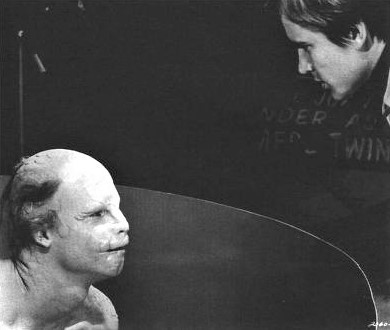
Kristina visits a carnival freak show and is horrified when she sees a bizarre “snake-man,” whom she recognizes as Stoner’s previous assistant, Tim. Distraught, she races back home to save David who is currently mutating into a king cobra, brought about by the injections Stoner has been giving him. Stoner is bitten by a real king cobra from his lab and dies, just as David’s transformation is complete. Kristina arrives home and finds her father dead with the real cobra next to him. Growing suspicious, the police then arrive and shoot the cobra before heading to the lab where a mongoose is attacking David’s neck, attempting to kill him. But the police do not have a clear shot, and as Kristina screams David’s name, the movie ends abruptly, leaving their fates uncertain.
BEHIND THE SCENES Released in 1973 by Universal on a double bill with The Boy Who Cried Werewolf. Sssssss was the initial collaboration of executive producers Richard D. Zanuck and David Brown who hired Twentieth Century-Fox’s head make-up chief, Dan Striepeke, to produce their first venture. Striepeke had worked with John Chambers on the unique simian make-up for the Planet of the Apes series at Fox, and was actually thinking about filming a man-into-snake movie at the time. While the problem of such a transformation seemed unfilmable. Striepeke hired screenwriter Hal Dresner to concoct a scary story with plenty of comedy relief, and then persuaded Chambers, along with Nick Marcellino, to provide a believable method of turning Benedict into a king cobra. Dresner’s original title for his script was King Cobra, but that really didn’t do anything for Striepeke, who came up with Sssssss when one of the hundred inhabitants recruited as supporting players from Hermosa’s hissed at him. All agreed that the unmistakable and universally feared sound.
youtube
“The idea of turning into a reptile fascinated me. Other than that, my role was kind of… well, I don’t want to say boring, but rather ordinary. I was playing the helpless victim. But I’ve always been interested in makeup. I had just come from New York when I got this job, so as a stage actor, I was used to doing my own makeup.”
For Sssssss, he was in the capable hands of two veteran makeup men. “Dan Striepeke, who also came up with the film’s story, had been head of makeup at 20th Century Fox,” Benedict says. “Dan and John Chambers won an Academy Award for Planet of the Apes. So, it was exciting to work with them. Both Striepeke and Chambers were much more excited and proud of the snake makeup than they were of their Apes work. It’s much more difficult to turn somebody into a snake!”
It was also much more time-consuming, but Benedict looked upon it as an adventure. “Four weeks before filming, the made a cast of my head and then built a snake-head to fit it, like a diver helmet. Then, I was completely shaved, and snake scales made of latex were applied all over my body.
“It took seven hours to apply the final snake makeup. It took four makeup artists, who then painted and textured the scales. And the early transformations, where I’m still half-human, took about four hours to apply. Those are the scenes where my head is a snake’s, but I still have wisps of hair and my body is still human. It was a tedious but very interesting process.
“It was a fun film, and Strother was a joy to work with. Unfortunately, the movie was not a success. Universal had high hopes for it and they even had a couple of sequels in line, but it didn’t make enough money.” – Dirk Benedict
This slideshow requires JavaScript.
Director Bernard L. Kowalski Interview
How did SSSSSSS come about? ! Bernard L. Kowalski: It was an original story idea that ! Dan Striepeke had: Dan had been a makeup artist, and he and John Chambers were credited with Planet of the Apes. Dan went to see Dick Zanuck, and Zanuck had responded to the story. It ended up being the first movie that Zanuck and David Brown made at Universal
And that’s where the film was shot? Bernard L. Kowalski: We did it entirely at Universal, the backlot and a few of the street areas around it: back near the Psycho house, we used the Virginian ranch as Strother Martin’s place. We shot it, I think, in about 22 days.
And your budget? Bernard L. Kowalski: Since we made it at Universal with their Overhead factors and everything else, it came to $1,030,000. We had high hopes for SSSSSSS, we owned a good piece of it, so there was a chance to be in a profit participation basis that might have proved quite lucrative. We’ve never really received any money on it in the way of profits, but that’s a tough thing to do at a major studio. It was quite well-received in Europe.
Were you happy with the unusual title, SSSSSSS (Don’t Say It, Hiss It)? Bernard L. Kowalski: Yes, I found it to be a title that created a lot of word-of-mouth. Part of how the title came up was, Dan Striepeke and I went to the Hermosa Beach Reptile Emporium during our initial investigation on cobras. The store owner pulled a cobra out-a totally poisonous, lethal cobra-and put it down at his feet. He was between us and the cobra, but it was a very small room, and we heard the sound that it made. That’s where we picked up the title of the show. It worked for us.
Did you enjoy working on this one as much as you did the Cormans? Bernard L. Kowalski: We had a good time making it. Dan Striepeke was a very bright, honest man, full of integrity; Zanuck and Brown were wonderful to work with, thorough gentlemen who had a lot of input; and Strother Martin was just a wonderful human being a lovely actor and a very funny man.
Did the snakes present any threat during production? Bernard L. Kowalski: We had 155 reptiles, and of that, we had like 60 or 70 that were lethal. The king cobra that we used was absolutely regal in the sense that he didn’t make mistakes twice. All the other snakes would hit the glass any time you’d go near them, but the king Cobra did it once, and then he’d just look at you. There were a lot of silly, fun things that we shouldn’t have done but we did. The very first day, for instance, I said to my assistant Gordon Webb, “I want you to tell everybody here there’ll be no games, no playing around. We’re in a position where it could be dangerous, and we’ll deal very heavily with anyone that fools around with this.” Well, he makes this speech, and the minute he gets done somebody throws a rubber snake at him and he screams at the top of his lungs. That was the end of it: after that, everyone was doing terrible things to everybody else all the way through
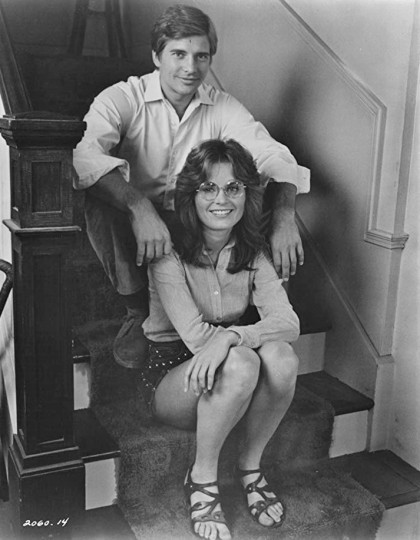
One story I enjoy telling on Dick Zanuck: Dick, who was very athletic, very much his own man, would come up to the set every day to offer his comments on dailies, but he never got too close to the snakes. So one of the young snake trainers, who didn’t know or care who anybody was, walked up to him and said, “You’re one of the big shots with the company, huh?” And Dick said, “Well, I’m the executive producer.” And the kid came back, “You’re also scared shitless of the snakes, huh?’ Dick just looked at him. The kid went on, “Yeah, I could tell. You haven’t come anywhere near ’em, and you get away as fast as you can.” Dick is the type of person that would swing on a lot of people who would call him that, but he got in his limousine and left. He came back in two hours, walked up to this kid and said, “Put the boa constrictor around my neck.” The kid looked at him and said, “You had a couple of drinks, huh?” Dick said, “Uh-huh. Put the boa around my neck.” And so they did it. That was kind of fun
What precautions did you take to safe guard your cast and crew against the snakes? Bernard L. Kowalski: We had a doctor there at all times, in case anyone had gotten bit by accident. I’d had all of the people that were going to be dealing with the snakes exposed to the hazards, dangers and limitations of the snakes prior to our filming Everyone was informed as to what we could fool around with and what we couldn’t fool around with. We had no problems, I’m very pleased to say.
One of the highlights of SSSSSSS is the effective makeup on Dirk Benedict. Bernard L. Kowalski: It was done by the best people in the makeup business, Dan Striepeke and John Chambers. At that time they were the very finest–they were Academy Award winners. Dirk Benedict was very patient–some of that makeup that they put on him took six to eight hours to apply. He was a wonderful person, by the way, a super guy. Heather Menzies and he were a wonderful team. It was a little family, all the way through working the picture, we did everything together, Strother and them, all of us. We shared all the good and the bad moments.
This slideshow requires JavaScript.
The most disappointing thing about SSSSSSS is its too-abrupt, let’s-get-this-thing done ending. Was that a last minute, money saving measure?
Kowalski: No, that was the original writing, We didn’t know where to go with it from the time that Dirk Benedict was killed. Being of the genre that it was the intent was to go out on the girl, Heather Menzies, screaming, and the terror of it. I can appreciate where you feel that it was abrupt. Obviously, in some senses, it didn’t work for us, but that was not done through an economy cut process.
Which is your personal favorite of the three horror/sci-fi films you directed? Kowalski: The most recent one, SSSSSSS because the memories are more alive and fresher for me. I’m a giant fan of Strother Martin, and it was one of the latter experiences he had in films. He was such a joy to work with man into a snake. Strother Martin played the mad doctor whose specialty was reptiles. He had a serpentarium and hired aides, whom he then experimented on. One of the actors was an amputee who was without his legs and one of his arms. He portrayed the specimen who was a by-product of the drug that Strother Martin injected into his aides He was entered as a freak in a sideshow
youtube
CAST/CREW Directed Bernard L. Kowalski
Produced Daniel C. Striepeke
Written Hal Dresner Daniel C. Striepeke
Make Up Effects John Chambers
Strother Martin as Dr. Carl Stoner Dirk Benedict as David Blake Heather Menzies as Kristina Stoner Richard B. Shull as Dr. Ken Daniels Tim O’Connor as Kogen Jack Ging as Sheriff Dale Hardison Kathleen King as Kitty Stewart Reb Brown as Steve Randall Ted Grossman as Deputy Morgan Bock Nobel Craig as Tim McGraw, the Snake Man

The Boy Who Cried Werewolf (1973) SUMMARY Robert Bridgestone (Kerwin Mathews), a divorced father, takes his son Richie (Scott Sealey) to the family mountain cabin. During a moonlight hike, the two are attacked in the darkness by a werewolf. During the struggle, the werewolf falls into a ravine and is impaled on a wooden fence, but not before biting Robert. Upon investigation, they find their attacker to be human. Unable to identify the body, the local sheriff concludes their attacker was a crazy drifter. Richie insists it was a werewolf, but his father and the sheriff laugh it off as childish imagination.
Concerned with Richie’s story, Sandy (Elaine Devry) insists her ex-husband talk with her son’s psychiatrist. The psychiatrist (George Gaynes) says that Richie’s werewolf fixation stems from his inability to accept that his father killed a man and instead has concocted a fantasy wherein his father bravely battles a monster. He suggests Robert take his son back to the cabin, predicting that when Richie returns to the scene and sees that everything is normal, his interest in werewolves will cease.
This slideshow requires JavaScript.
Returning to the cabin during another full moon, Robert experiences a wave of pain and sends Richie off to the stream. As he watches in a mirror, Robert changes into a duplicate of the creature he had killed. When Richie sees what is apparently the same werewolf resurrected, he flees to the woods, crossing a mountain road. The werewolf pursues, causing vehicles to crash. One driver is then dismembered by the creature. Richie comes upon two newlyweds camping. While they do not believe the boy’s story, they see his distress and agree to take him home. Arriving at the cabin, Richie’s father is nowhere to be seen, and Richie begs the man to let him return with him to the camper for the night. The next morning Robert, appearing dazed and confused, shows up at the camper and tells the couple he has been searching for Richie all night. Richie tells his father about the werewolf, but Robert is clearly losing patience with his son’s fantasies.
During the following night’s full moon, Robert transforms and searches through the house for Richie who, in anticipation, has hidden himself. The werewolf then seeks out the newlyweds, pushing their camper down a hill. He mutilates their bodies, carrying away one of the heads. Returning to the cabin’s shed just before daybreak, he digs a hole to bury the head. Richie, hearing noises, sneaks down to the shed and witnesses the werewolf’s changing back into his father. Moments later, the sheriff arrives to report on the previous killings, convinced of a connection between the attacks. On the drive home, Richie questions his father about his actions, but Robert dismisses everything, clearly irritable and bothered about his memory blackout. Richie jumps hurriedly out of the car upon arriving at his mother’s, telling her that he is scared to be alone with his father, because his father is a monster.
This slideshow requires JavaScript.
Sandy talks with Robert about their son’s fears and how Richie thinks Robert is a werewolf. It is agreed that another visit with the psychiatrist is in order. The doctor tells Robert that Richie genuinely believes that Robert is a werewolf, and that these type of fantasies can be quite powerful for children. The doctor tells Robert that werewolf victims suffer from amnesia and their hands will become deformed the longer they are infected. As their session goes on, the full moon rises and Robert kills the doctor. Meanwhile, Sandy tells Richie this time she will go with him and Robert for a family weekend.
The next day, a reluctant Richie and his mom prepare to leave for the cabin with Robert, unaware that the headline of the morning paper reads “Local Psychiatrist Murdered”. The three set out for the cabin, stopping at a hippie commune on the way. The hippies, with their wild-eyed leader (Bob Homel), are forming a circle of power to drive away evil spirits. When the family stop to watch, the hippies shout at them to join in, and while an amused Sandy agrees, when Robert tries to enter the circle, he is stopped short and cannot move further, as if an invisible barrier were before him. A disturbed Sandy grabs him and they get back in the car and continue to the cabin, where they settle down for the evening. Sandy talks gently with Robert, confessing that she has really missed him and that perhaps they should get back together.
The full moon rises, and Robert turns his back on her, silently walking away. In the shed he finds Richie, digging up the bag he had seen his father (in werewolf form) burying on their previous visit. Robert grabs Richie, clearly in the first stages of transformation, and begs Richie to lock him in the shed. Richie does so, but as he finishes, his mother sees him and hears the noises in the shed. Richie tells her it is his dad in there, whereupon she scolds Richie and tries to open the shed. Richie screams at her just as a clawed hand bursts through the door. Richie and his mother run to the car, escaping just as the werewolf emerges, screaming and snarling. The werewolf attacks the hippie commune and as the sun rises, the werewolf weakens and collapses. The hippies witness the beast’s transformation back into Robert, and though not understanding what they are seeing, they pray for the creature’s soul. Upon regaining consciousness, Robert flees into the woods.
Richie and his mother seek help from the sheriff, but upon returning to the cabin they find the creature gone. The Sheriff leaves some men to stand guard, while Robert watches from the woods and sees that his index finger has now become deformed. Later that evening, as Sandy sleeps by the fire, the werewolf slips silently through a cabin window. Sandy awakes to find it staring her in the face. It starts to carry her off, but on hearing her screams, the deputies burst in, opening fire as the monster jumps out the window. Richie begs for them not to hurt his dad, but of course everyone still cannot accept that it is a werewolf, let alone Richie’s father.
This slideshow requires JavaScript.
That evening, as the sheriff organizes a search party, Richie breaks away and heads off to try to save his father. As the moon rises, Richie finds his father, once again transformed, who grabs him and carries him off, with the mob close behind. Cornered, the werewolf attacks Richie, biting him on the arm, before a hail of gunfire distracts him. The bullets cannot kill him, but frantically attempting to flee, he stumbles and falls on the broken stake that held the hippies’ cross to the ground. It pierces his heart, and as a horrified Richie and Sandy watch, the werewolf transforms back into Robert. The last thing we see is Sandy examining her son’s bite mark, with dawning horror on her face (implying that Richie will be cursed to become a werewolf now).
BEHIND THE SCENES The Boy Who Cried Werewolf is a 1973 Technicolor horror film directed by Nathan H. Juran, who came out of retirement to make the film as a favour to producer Aaron Rosenberg. Kerwin Mattews was closing out his career in 1973, with this film. “That was the absolute pits,” he relates. ‘ ‘The makeup took about four hours to apply, and almost as long to remove. The torture was immense. I couldn’t even eat during the day because I couldn’t move my face. The first time I saw myself in the full werewolf makeup, I thought: ‘Kid, this is definitely your last film.’ After that, I didn’t want to go on any more.”
youtube
CAST/CREW Directed Nathan H. Juran
Produced Aaron Rosenberg
Written Bob Homel
Makeup Department Thomas R. Burman
Kerwin Mathews as Robert Bridgestone Elaine Devry as Sandy Bridgestone Scott Sealey as Richie Bridgestone Robert J. Wilke as the Sheriff Susan Foster as Jenny Jack Lucas as Harry Bob Homel as Brother Christopher George Gaynes as Dr. Marderosian Loretta Temple as Monica David S. Cass Sr. as Deputy (as Dave Cass) Harold Goodwin as Mr. Duncan Tim Haldeman as First Guard John Logan as Second Guard Eric Gordon as Hippy ‘Jesus Freak’ Paul Baxley as First Werewolf
REFERENCES/SOURCES Starlog#120 Starlog #247 Making a Monster Al Taylor and Sue Roy Son of Guilty Pleasures of the Horror Film
Drive-In Double Feature Released in 1973 by Universal Movie Studio
Drive-In Double Feature Retrospective#01 Sssssss (1973) SUMMARY Dr. Carl Stoner (Martin), a herpetologist, sells a mysterious creature in a crate to a carnival owner.
0 notes
Text
The Iron God and The Lair of the Grimalkin
Jack Williamson’s career in science fiction is long and distinguished, starting with his first story, sold to Hugo Gernsback in 1928, and enduring into the 21st century. He is perhaps best known for his Legion of Space. And, to be fair, I wish my introduction to him was there.
Instead, curiosity got the better of me when I saw “The Iron God” in SFFAudio’s Public Domain files. The combination of dive bombers attacking a metal giant and a science fiction story published in Marvel was too much to pass up.
Unfortunately, time has not been kind to “The Iron God”, as its hopeful optimism, mad science, and star child tropes have been ground into dust over the resulting seventy and more years as science fiction magazines, books, and drive-in movies have copied the same themes and plot elements. And the sea change that accompanied post-modernism shifted views about science away from the path to a rosier dawn towards the leading suspect of who will kill our tomorrows. From that vantage point, the clumsy attempt of a mad scientist to create a New Man who would not heed the Old Lies serve more as a warning against secret kings than a reproach of a species that kills what it doesn’t understand.
That said, the reason “The Iron God” does not shine has more to do with the dross that followed it than it’s own faults. At best, it is average. Really, the radioplay of the doomed dive bombers is the highlight.
Pulp fiction’s fascination with Colonel Percy Fawcett continues, as the mad scientist father of the Iron God disappears into the South American jungles. However, it has changed from men of action and science like Doc Savage into brilliant lab rats content with mere moral victories.
I’ll try Williamson again, as his presence inspired and shaped much of traditional science fiction since before the Campbelline Age. But this time, I’ll stick closer to the beaten path
For five years, from 1943-1948, Richard Shaver exploded on the scene with his Shaver Mystery, an X-Files-like set of mysteries filled with secret worlds and hidden cavern cities, much to the frustration of science fiction fans. During this time, Amazing‘s circulation swelled to nearly 200,000 per issue. (Weird Tales and Astounding averaged 50,000) Meanwhile, SF fandom tried to cancel Shaver through boycott and letter-writing campaigns, creating an ugly tradition that still carries on to today. 1948, Amazing stopped publishing the Shaver Mystery, for reasons unclear, and Shaver spent many years chasing after the success he once had.
“The Lair of the Grimalkin” is one such attempt under the pen name G. H. Irwin, a sword & planet tale set on Venus. Here, Venus is a green Hell here, teaming with a mix of life and chemicals that limit Earthmen to small sections of the planet. But the lush life covers vast mineral wealth, so men repeatedly set forth into the jungles. They just don’t come back.
Tempted by riches and the verdant hellscape, Hal has a line on a massive deposit of platinum in the well-named Swamp of Despair, and the story begins with preparations for an expedition that’s most likely doomed.
Then, deep in the Venusian Amazon, Hal finds the rarest flower on the planet–a human woman surviving where explorers never did. Her jungle home is threatened by the Grimalkin, a kind of dragon, so Hal decides to play St. George.
But things aren’t as they seem, as a failed attempt at killing the alien Great One lands them in captivity, alongside the girl, in a Venusian village. Shaver doesn’t bother filing serial numbers off of dragon myths here, so Hal and his companions have to escape–or be dinner. The resulting fight rages across Venus, back to the Earthman domes before the dragon finally is slain, and Hal earns his babies ever after ending.
I was expecting dreck from Shaver, as his memory is maligned even to this day. This wasn’t bad. Frankly, “The Lair of the Grimalkin” holds up better as a story than Williamson’s “The Iron God.” There’s more humanity to this transplanted jungle adventure, for one. Shaver has imagination, to be sure, but he needs an editor. The folksy style doesn’t lend itself well to the exposition needed for worldbuilding and Shaver’s fascination with making up his own language.
For a man who is derided for his fascination with the paranormal, Shaver’s chemistry is surprisingly crunchy. More than one compound and ore that sounded like blatant unobtanium actually exist with the compositions Shaver describes.
There are massive Lost City of Z resonances here, which shouldn’t be a surprise as pulp was smitten with the real-life adventures of Colonel Percy Fawcett, who inspired elements of the adventure pulps, hero pulps, and the weird pulps.
As a result, I would love to see what Shaver might have done in an Argosy-style adventure. He had the formula and the verisimilitude. But the paranormal and the pseudoscientific were instead his fascination–and his reputation among the “notables” of science fiction fandom suffered for it.
The Iron God and The Lair of the Grimalkin published first on https://sixchexus.weebly.com/
0 notes
Link
Do you ever take into consideration a few of your favourite motion pictures and surprise, what ever occurred to that actor? Typically it’s simply part of the enterprise – an actor stars in a single iconic position, then they’re by no means heard from once more. Or, they keep within the leisure enterprise and simply hold comparatively quiet.
There are many actors who select to depart Hollywood to guide regular lives, however generally issues aren’t that straightforward. In lots of instances, actors have chosen for private causes to give up appearing all collectively, and generally they're pushed out by forces past their management.
The movie star life isn’t for everybody, and the lime-light may even drive you insane. The next actors have been M.I.A. for fairly some time, and their causes for abandoning Hollywood could also be stranger than you assume.
Listed below are 15 Actors Who Give up Hollywood For Stunning Causes.
1. RAY SHARKEY
Ray Sharkey’s total downfall in Hollywood is one large cautionary story. After discovering success in The Idolmakerand Clever Guys, Sharkey was identified as HIV optimistic. Most attributed this to his heroine use, and after being fired from The Hal Squad for drug possession, his private life was immediately a public sensation.
Although denying he was contaminated, a number of lovers of Sharkey’s claimed he contaminated them with HIV. In 1992, Sharkey’s former lover Elena Monica sued him for $52 million, claiming Sharkey knowingly contracted her with HIV. Sharkey’s supervisor claims he had intercourse with virtually 100 girls after he already knew he was HIV optimistic.
Sharkey constantly denied these claims, till the illness was simply too apparent to disclaim any longer. He claimed that he had a pressure of HIV that will not flip into AIDS, however he in the end died of AIDS issues in 1993.
2. FRANCES FARMER
There’s nothing fairly just like the story of Frances Farmer’s abrupt Hollywood exit. There have been books, movies, and loads of hypothesis surrounding what precisely occurred to this former star.
The primary signal of hassle occurred when Farmer was arrested for driving along with her headlights on in a war-time blackout zone. Police stated she was erratic they usually jailed her in a single day. Over the subsequent few years she was out and in of courtrooms and psychological establishments, identified with paranoid schizophrenia. She tried and didn't make a comeback within the ’50s, and died in 1970.
With the assistance of a good friend, Farmer wrote a e book about her life proper earlier than she died. The e book chronicled a number of abuses that Farmer allegedly endured by the hands of police and medical doctors. Some declare she could have even been lobotomized – though unlikely, it has turn out to be a part of her story. We could by no means know the complete reality, however there’s no denying Farmer’s profession downfall was a wierd chain of occasions.
three. JOE PESCI
When Joe Pesci determined to announce that he was quitting appearing, it got here as a shock to many followers who had gotten used to him and Robert DeNiro as an unstoppable large display screen pair. There’s no arguing that Pesci is a massively gifted actor who’s been in iconic movies, so why the choice to depart all of it?
Although he’s principally identified for appearing, Pesci was really a lounge singer earlier than turning into large in Hollywood. He determined to depart the film scene and deal with popping out together with his album, titled Vincent Laguardia Gambini Sings Simply For You. The album performed on his My Cousin Vinny character’s persona.
Pesci has been out of the highlight since, however that every one could change quickly, as he's set to look in Martin Scorsese’s upcoming 2019 movie The Irishman.
four. GRETA GARBO
Greta Garbo, in her prime, was actually in every single place in Hollywood. As we’ve seen, generally one movie can flip a star off of Hollywood for good – and this was precisely the case with Greta Garbo.
After starring within the 1941 movie Two-Confronted Girl, Garbo left appearing for good. The movie obtained such horrible critiques that she known as it her “grave” and declined all affords to look on display screen once more – and sure, there have been loads of affords. Even one of the best actors have their unhealthy motion pictures, so why couldn’t Greta Garbo recover from hers? Hollywood was prepared to just accept her once more, however Garbo couldn't discover it in herself to come back again after such a failure.
5. RANDY QUAID
In his prime, Randy Quaid was in a number of the most iconic motion pictures so far – Independence Day and Nationwide Lampoon’s Trip to call a pair. Whereas Randy’s brother Dennis Quaid has stayed within the highlight for many of his profession, we haven’t seen Randy on the massive display screen since 2009. So what occurred?
In a wierd chain of occasions, Quaid and his spouse went on a Bonnie-and-Clyde kind of downward spiral. Initially arrested for defrauding a lodge, the couple have been launched on bail, however continued to fail to look at scheduled court docket dates. After a couple of extra authorized battles out and in of court docket, the 2 moved to Canada, the place they have been once more arrested for excellent warrants within the U.S.
6. MICHAEL RICHARDS
Typically earlier than you may give up the enterprise, the enterprise quits you. In a kind of involuntary quitting state of affairs, Michael Richards was compelled to eat his phrases after utilizing racial slurs in direction of viewers members at a stand-up gig in 2006.
Most know Richards from his Seinfeld position as everybody’s favourite loopy neighbor, Kramer, however his legacy has now been tainted by his racist rant. He admitted that he regrets his outburst, and the detrimental response to his stand-up was a “actuality test” for him, and that he'll doubtless not be pursuing stand-up comedy as a result of it isn’t his sturdy go well with.
7. DANIEL DAY-LEWIS
For being the one particular person to ever win three Greatest Actor Oscars, Daniel Day-Lewis’s abrupt announcement that he was quitting appearing for good got here as a shock to some – however to not all.
Curiously sufficient, this isn’t the primary time that Day-Lewis has “retired” from the lime gentle. In London’s Nationwide Theatre in 1989, whereas on stage performing Hamlet, Day-Lewis introduced his departure, and left the efficiency, by no means to return to the stage once more. Within the 1990s he moved to Eire for extra time without work, being extremely secretive and private. Most individuals accepted this as regular Day-Lewis conduct too.
Supposedly, although, this most up-to-date announcement of leaving the business shouldn't be merely “time without work,” it’s last. His final look can be within the film Phantom Thread, which comes out December 25, 2017.
eight. RICK MORANIS
Sadly the explanation Rick Moranis left Hollywood on the peak of his fame was something however voluntary. When his spouse died of most cancers in 1991, Moranis took an appearing hiatus, and by 1997 he was fully carried out making motion pictures to deal with being a full time dad or mum to his two kids.
Moranis cited being a single dad or mum as his essential cause for leaving the highlight in his prime, he instructed The Hollywood Reporter, “I took a break, which was an extended break”- 18 years, to be actual. He’s been performing some writing and voice work since, however has but to return to motion pictures. He didn’t totally neglect the concept of coming again to appearing, including “as quickly as [a role] comes alongside that piques my curiosity, I’ll do it.”
9. STEPHEN COLLINS
TMZ obtained a recording of Collins confessing, in what was speculated to be a closed remedy session, that he had molested underage women previously. His spouse on the time, Faye Grant, recorded these periods with out Collins or the therapist’s data. Finally this result in Collins coming ahead and admitting his guilt, saying he had an issue, however that he hadn’t had these urges in 20 years.
Be that as it might, the general public noticed his confession as unforgivable, and Collins hasn’t appeared to make an effort to come back again to Hollywood since this scandal.
10. SHELLEY DUVALL
Shelley Duvall is thought by most as Jack Torrance’s nervous, screaming, and crying spouse Wendy in The Shining. It’s a task that has turn out to be identified for a way tough it was on the actress – Duvall recounts crying for 12 hours a day, 5 or 6 days per week, for months on finish.
In addition to her issues with Stanley Kubrick, Duvall continued her profession working in loads of movies. It wasn’t till not too long ago that the world was made conscious of Duvall’s private issues that triggered her to give up appearing, by means of TV psychologist Dr. Phil. On his present she admits to needing assist, and in addition says she believes Robin Williams continues to be alive.
11. CAMERON DIAZ
It’s fairly widespread for celebrities to take a break from the limelight, however after three years with out being in a movie and no future initiatives to be spoken of – it’s not sure if Cameron Diaz will return to Hollywood anytime quickly, if ever.
She instructed E! Information throughout a panel dialogue, “I simply went, ‘I can’t actually say who I'm to myself,’ which is a tough factor to withstand.” She additionally identified that she didn’t get married till 41, a choice that had lots to do along with her profession and discovering the precise proper particular person for her.
12. JACK GLEESON
It got here as a shock to many when Jack Gleeson merely instructed followers that he would not be appearing. After scoring as enormous a task as King Joffrey Baratheon on the hit present Sport of Thrones, Gleeson discovered that appearing simply wasn’t for him.
He instructed the Irish Unbiased, “the approach to life that comes together with being an actor in a profitable TV present isn’t one thing I gravitate in direction of.” On the mere age of 25, Gleeson appears to have a superb head on his shoulders, and whereas he had no detrimental experiences to say, he gravitates in direction of an easier life.
On the subject of appearing, he says, “it was all the time a recreation beforehand,” and when it grew to become greater than that, he realized he needed to stroll away. He could also be carried out with Hollywood for good, however he certain did depart his mark in an enormous approach.
13. TAYLOR MOMSEN
There’s doubtless one among two methods you realize Taylor Momsen – because the cute resident of Whoville, Cindy Lou Who, in How the Grinch Stole Christmas, or from her later position as Jenny Humphrey in Gossip Woman. With a stable filmography to again her, there’s doubtless no position Momsen couldn’t have gotten herself – that's, if she needed to maintain appearing.
Seems that Momsen’s real love is music, and since Gossip Woman she’s left the appearing life to deal with her actual ardour – her arduous rock band The Fairly Reckless. It’s by no means been a secret that Momsen has a lovely voice, however who knew she would ditch Hollywood stardom to sing about intercourse, medication, and rock’n’roll. Momsen admitted to Elle, “hopefully I’ll have the ability to solely do [music] for the remainder of my life.”
14. SEAN CONNERY
In addition to James Bond, Sean Connery has performed many notable roles – however what could also be extra notable are the roles he refused. Connery turned down the position of Gandalf within the The Lord of the Rings trilogy, which was clearly a mistake, and he additionally turned down a task in The Matrix, one other trilogy alternative slipping by means of his grasp.
So, there could possibly be an argument made that when The League of Extraordinary Gents got here his approach, Connery put warning to the wind and determined to lastly attempt his hand at a big-budget motion flick poised to be a franchise. After passing up two gems, sadly, he picked incorrect, and The League of Extraordinary Gents was an enormous flop.
15. AMANDA BYNES :
In the event you ever go on the web or watch TV, there’s a superb probability you’ve heard about Amanda Bynes’ public meltdown. From stealing jewellery to tweeting at Drake, Bynes was stunning the world each day along with her loopy antics. Essentially the most weird half is that she didn’t even attempt to cover it, outright telling followers that she didn’t love appearing anymore. It was revealed that medication have been behind a lot of her conduct, and fortunately since she’s gotten assist.
It could look like latest historical past, however it’s now been 5 years since Bynes’ issues started, and virtually eight years since we final noticed her in a film – Simple A. Bynes has been occupying her time at style faculty, and even expressed curiosity in coming again to appearing. No initiatives are confirmed but, so we’ll see if Bynes can efficiently make a comeback or if she’ll stay one other misplaced little one star.
0 notes
Text
Some Thoughts on College and the Politics and Morality of Technology
So I have to write some stuff about my college experience and all the stuff I’ve learned and think about it for a class. It was something I was dreading because I hate writing stuff like that, but I sat down and a lot of different stuff came to me? So yeah, here’s a Puke Draft of that. I’m posting this literally after I finished typing it, so there’s bound to be grammatical and factual errors. But hey, Tumblr’s probably the best place for shit like that anyway.
Work is perennially an unknown land. Trying to teach about the workplace might even be a bit of a fools errand. This is simply because the workplace of our teachers is not our workplace. This is especially true in our field of computer science. The way we work and the work we do changes rather drastically from generation to generation. For example, say someone had tried to teach Steve Jobs how the workplace of his time operates. What model would that teacher have used? They would probably have pointed to IBM or TI. But those workplaces were radically different to what Steve Jobs would end up building. Perhaps not in structure, but certainly in culture. And that’s what these classes are supposed to teach us. They’re supposed to take us from the comfortable college culture mindset into the squeaky clean and upright corporate culture mindset.
The primary reason I disagree with this is because outside of class we hear stories about this revolutionary figures in tech. We hear about Jobs and Wozniak, we hear about Gates, all the stories about how these guys abandoned college and built the future in garages and by stealing computer time from companies and schools. Yet we’re groomed specifically not to follow these mindsets. The preparation we get is specifically to not follow in their footsteps but instead to be the grunts of people like this. To work under them, to follow not the exciting (if tumultuous) time of their early lives but the ironed out and pristine ideals that their creations currently have.
I am, of course, not saying that our professors should stand before a whiteboard and outline the five reasons why leaving college is totally cool. That would probably be counterproductive. However, is creativity that bad? Is the mold really that good? Is all we can hope for simply to put on a button-down shirt and fix bugs for a Point of Sale company? This would be easier to believe if the Jobs and Gates stories were simply things of the past. If they were akin to myths, something that happened ages ago but would be impossible today. But that is not the case. The Jobs and Gates stories are happening over and over again every day. One might even argue that the best work today is being done by these startups. After all, the only time we hear about truly revolutionary tech from The Big Five is when they cannibalize another company just to put a different logo on their tech.
I write this more as an indictment of the system rather than an indictment of this particular class. Because while this class was certainly the most explicit manifestation of this tendency, it is by no means the only one. Another frustrating example is with the actual examples we get in our courses. Do you know how many Point of Sale programs I’ve done? I’m fairly certain I’ve done at least ten throughout my time in college. Are there really that many permutations of this idea? Not really. They are all the same program. The code barely changes at all. But every professor in every class makes us do at least one. Even in more open classes where we’re supposed to choose what we do we all end up doing POS programs because that’s eventually the only thing that gets accepted. I’ve had to sit beside classmates and watch their frustration as every cool idea they want to do gets shut down by a professor because it sounds too difficult, too easy, outside the scope of the class, or whatever excuse they end up bringing up.
This extends to the medium of work too. Pretty much all we get to use is Visual Studio and Visual Basic. With the exception of one class in C++ and maybe two in Java (both of which are deeply frustrating to work with and not in particularly wide use). We have classes where we’re supposed to show that ‘We Can REALLY Program, Like For Real™’ this would lead you to believe that we get to choose what we do and how we do it, right? After all, the best way to show that you can do something is to let you do it the best way you can and that is therefore the way you’ve learned best. But no. For some reason that is not how we do things at all. For us to show them that we’re ‘Real Programmers’ we have to do whatever we want (a POS but we get to choose what the thing we’re selling is!) but in a specific language with a specific IDE and a specific database. In doesn’t matter if, for example, I know how to program much better in Ruby or Python than in Visual Basic. The professor doesn’t care at all. I can only prove to him I’m a programmer if I use the language he has deemed Right.
This would be less frustrating if the things we’re using were new and exciting things. The things we read about. The things that are actually being used right now. But, hey, it doesn’t matter that mobile programming is the number one thing every worthwhile company is doing. We still want you to program stuff for the desktops that no one but us uses anymore. So this means that not only are we being trained in a culture that might not exist anymore (or if it does is probably on its way out) we are also being trained in technologies that are in the same boat. Which then begs the questions, is Thiel right? I want nothing more than for him to be wrong. I value college, I’ve loved a lot about my experience here, but when I started working in a startup and the only skills I’ve had to use were skills that I had to learn on my own it’s hard not to question why I even bother entering a classroom anymore.
I don’t think there is a perfect solution to this. If there is anything learned from this piece let it be that. I know that colleges are in a tough spot when it comes to technology. After all, I don’t believe that overhauling an entire curriculum is an easy thing. Technology moves too fast for most people to keep up with let alone an entire institution. I know that. But we should do something to mitigate that. I’ve had professors give me tutorials from, like, 2008. Tutorials that are completely useless because they use an archaic version of Visual Studio while the professor forces us to use Visual Studio 2013. I find it hard to believe that there isn’t an easy fix for problems like that. The other thing is that perhaps we should find a higher focus on the abstract things. More on what a variable is and less on how to use on in Visual Basic, to use a simplistic example.
That leads me to another frustration I’ve had. And that is that we learn technology in a meaningless way. That is to say that we learn technology but not the meaning of it. There is no class that studies the effects of technology and barely any professor (with perhaps one exception) that makes any allusion to the fact that technology has a cost. Not a monetary (something that we’re barely taught either), but a human one. We’ve never had to sit down and face the fact that the work we end up doing might be very exciting but might destroy the lives of a lot of people. That while AI and automation are cool buzzwords and make us feel very intellectual that they might mean the destruction of human lives. I do not mean in this in the way that the media often does. I do not think that Google is going to build Hal or the Terminator. But that by virtue of these technologies existing a lot of people are going to be put out of work. This might be unavoidable, but it doesn’t mean that we should ignore it. It is our job as the people that might be willing accomplices to face this fact.
We like to pretend that because what we do is a ‘science’ that it is inherently centrist or apolitical, and amoral. After all, how can one say that building a computer is political? How can a program have morals? A program is a sophisticated form of Math and Math doesn’t have morals and isn’t political either. What we do is science and engineering, there is no room for the humanities in it. In fact, there is barely room for humanity in it. But that’s not true. And there have been several great computer scientists and programmers that have understood this. My favorite example is always Ada Lovelace. Who understood, even in her seemingly prehistoric age, that science and art were linked and that science could be indistinguishable from art. Ada Lovelace whose first thoughts, even before computers and programs really existed, was of a machine that could create music. She saw the beauty in technology beyond the Math and the metal. But while Ada’s DNA is in every machine we use, her ideals are nowhere to be found.
Ada Lovelace is not the only person to notice this and also go completely unmentioned in all of our courses. We are always taught about Jobs and Gates and their particular histories, it’s why I chose them as the first example. But there is never any mention of the contemporary movements that were happening around them. Pull aside anyone from our course and ask them what the Whole Earth Catalog is. Ask them who Richard Stallman is and what the free software movement is. Do you think they’ll be able to answer? In this course we once had to read and explain an entire TOS (a fundamentally useless and virtually impossible task) but did we then also explain what the GPL is and how it works? How can there be nothing wrong in this? How can we keep saying that these things don’t matter, that we’re being fair and beyond politics, morality, and anything to do with the Humanities. Why do we even want that anyway?
0 notes
Text
THE PORTRAIT ARTIST
August 6, 1948
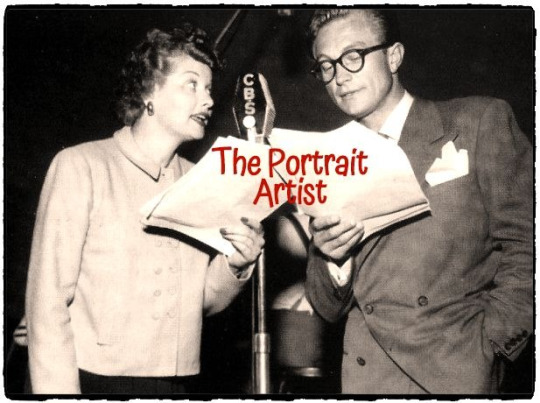
"The Portrait Artist” aka “The Portrait Painter” aka “The Portrait” is episode #3 of the radio program MY FAVORITE HUSBAND broadcast on August 6, 1948 on the CBS Radio Network.
Synopsis ~ Liz is having her portrait painted by a handsome but gruff artist. George gets jealous and fakes illness, and he is attended to by a sexy young nurse - causing the green-eyed monster to rear between both Cugats!
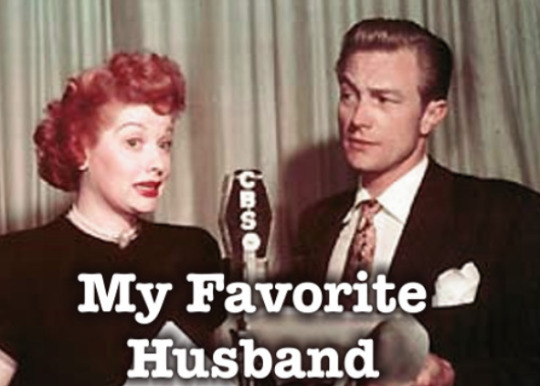
MAIN CAST
Lucille Ball (Liz Cugat) was born on August 6, 1911 in Jamestown, New York. She began her screen career in 1933 and was known in Hollywood as ‘Queen of the B’s’ due to her many appearances in ‘B’ movies. With Richard Denning, she starred in a radio program titled “My Favorite Husband” which eventually led to the creation of “I Love Lucy,” a television situation comedy in which she co-starred with her real-life husband, Latin bandleader Desi Arnaz. The program was phenomenally successful, allowing the couple to purchase what was once RKO Studios, re-naming it Desilu. When the show ended in 1960 (in an hour-long format known as “The Lucy-Desi Comedy Hour”) so did Lucy and Desi’s marriage. In 1962, hoping to keep Desilu financially solvent, Lucy returned to the sitcom format with “The Lucy Show,” which lasted six seasons. She followed that with a similar sitcom “Here’s Lucy” co-starring with her real-life children, Lucie and Desi Jr., as well as Gale Gordon, who had joined the cast of “The Lucy Show” during season two. Before her death in 1989, Lucy made one more attempt at a sitcom with “Life With Lucy,” also with Gordon.
Richard Denning (George Cugat) was born as Louis Albert Heindrich Denninger Jr., in Poughkeepsie, New York. When he was 18 months old, his family moved to Los Angeles. Plans called for him to take over his father's garment manufacturing business, but he developed an interest in acting. Denning enlisted in the US Navy during World War II. He is best known for his roles in various science fiction and horror films of the 1950s. Although he teamed with Lucille Ball on radio in “My Favorite Husband,” the two never acted together on screen. While “I Love Lucy” was on the air, he was seen on another CBS TV series, “Mr. & Mrs. North.” From 1968 to 1980 he played the Governor on “Hawaii 5-0″, his final role. He died in 1998 at age 84.
Ruth Perrott (Katie, the Maid) was also later seen on “I Love Lucy.” She first played Mrs. Pomerantz, a member of the surprise investigating committee for the Society Matrons League in “Pioneer Women” (ILL S1;E25), was one of the member of the Wednesday Afternoon Fine Arts League in “Lucy and Ethel Buy the Same Dress” (ILL S3;E3), and also played a nurse when “Lucy Goes to the Hospital” (ILL S2;E16). She died in 1996 at the age of 96.
GUEST CAST

John Hiestand (Cory Cartwright) served as the announcer for the radio show “Let George Do It” from 1946 to 1950. In 1955 he did an episode of “Our Miss Brooks” opposite Gale Gordon in which he once again had the surname Cartwright.
The role of Cory Cartwright was originated by Hal March but Hiestand very quickly replaced him. March did, however, stay with the show and appears from time time as various characters.
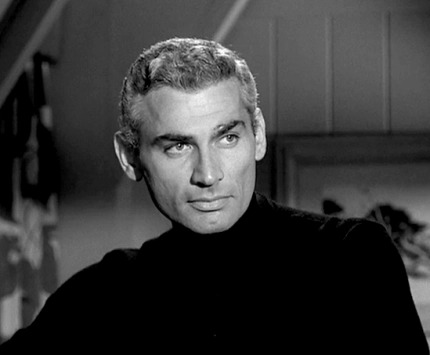
Jeff Chandler (Damon Welch) was known for his prematurely gray hair and striking good looks as a young man. On radio, he was on “Our Miss Brooks” as Mr. Boynton with Eve Arden. When the series moved to television in 1952, Chandler was replaced by Robert Rockwell. Chandler died at age 42 from blood poisoning after an operation.
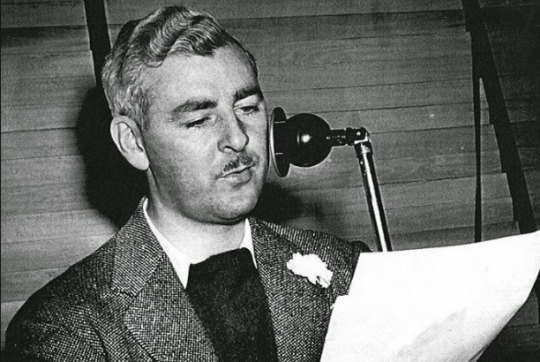
William Johnstone (Doctor) is best known for his voice work as the title character on “The Shadow” from 1938 to 1943, replacing Lucille Ball’s friend Orson Welles. He played John Jacob Astor in the 1953 film Titanic.

Mary Shipp (Nurse Mary Ann McCarthy) was a radio and TV actress and the second wife of CBS Executive Harry Ackerman. Shipp played a recurring character on CBS’s “My Friend Irma” (1954-55) which featured Gale Gordon’s mother Gloria and Hal March, who was the first actor to play Cory Cartwright.

“My Favorite Husband” was based on the novels Mr. and Mrs. Cugat, the Record of a Happy Marriage (1940) and Outside Eden (1945) by Isabel Scott Rorick, which had previously been adapted into the film Are Husbands Necessary? (1942). “My Favorite Husband” was first broadcast as a one-time special on July 5, 1948. Lucille Ball and Lee Bowman played the characters of Liz and George Cugat, and a positive response to this broadcast convinced CBS to launch “My Favorite Husband” as a series on July 23, 1948. Bowman was not available Richard Denning was cast as George. On January 7, 1949, confusion with bandleader Xavier Cugat prompted a name change to Cooper. On this same episode Jell-O became its sponsor. A total of 124 episodes of the program aired from July 23, 1948 through March 31, 1951. After about ten episodes had been written, writers Fox and Davenport departed and three new writers took over – Bob Carroll, Jr., Madelyn Pugh, and head writer/producer Jess Oppenheimer. In March 1949 Gale Gordon took over the existing role of George’s boss, Rudolph Atterbury, and Bea Benaderet was added as his wife, Iris. CBS brought “My Favorite Husband” to television in 1953, starring Joan Caulfield and Barry Nelson as Liz and George Cooper. The television version ran two-and-a-half seasons, from September 1953 through December 1955, running concurrently with “I Love Lucy.” It was produced live at CBS Television City for most of its run, until switching to film for a truncated third season filmed (ironically) at Desilu and recasting Liz Cooper with Vanessa Brown.
This episode aired on Lucille Ball’s 37th birthday, August 6, 1948.
At this point in the series, George and Liz are still named Cugat. Their surname will be changed to Cooper in 1949 to avoid confusion with a famous Latin bandleader. No, not Desi Arnaz - Xavier Cugat! Also, the show had yet to introduce Iris and Rudolph Atterbury, the secondary characters, similar to Fred and Ethel on “I Love Lucy.” The character of Cory Cartwright, a handsome bachelor friend of the couple, will shortly be phased out. He was initially played by Hal March, but here played by John Hiestand.

Marital jealousy and painting were also the subjects of “My Favorite Husband” the CBS television show on November 29, 1955.
THE EPISODE
Announcer Bob LeMond sets up the premise of the series:
Ten years ago the town’s most eligible bachelor, George Cugat, married socially prominent Elizabeth Elliott. The lavish wedding kept the society columns all over the country in copy for weeks. The New Yorker said:
“The bride and groom were dressed with the nth degree of smartness. The best man was a polo pony.”
The Hearst Papers said:
“The bride and groom were dressed handsomely and attracted comments from guest Douglas MacArthur.”
And The Reader’s Digest said:
“The bride and groom were dressed.”

The joke lies in the brevity of the Digest’s comments. The Reader’s Digest was known for their publication of abridged novels, short stories, and articles that could be read in one sitting. Ricky was seen reading the Digest in “Lucy Writes a Novel” in 1954. That same year, a biography of Ball by Eleanor Harris was included in the Digest - condensed, naturally. Ball appeared on the covers in 1990 and 2003.
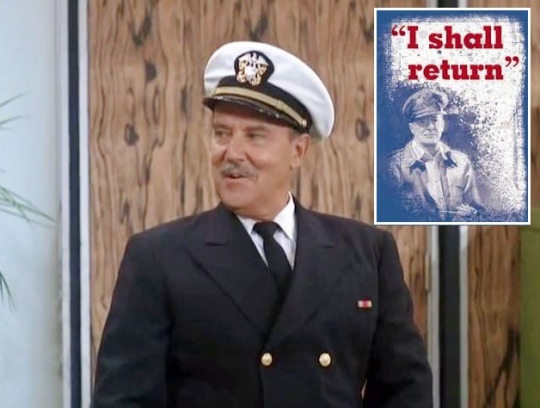
Douglas MacArthur (1880-1964) was a five-star general and Chief of Staff of the United States Army during the 1930s. He played a prominent role in the Pacific theater during World War II. At the time of broadcast, he was running for President of the United States, but was defeated in the primaries by Dewey, who was narrowly defeated in the election by Harry S. Truman. In “Lucy and the Submarine” (1966) Mr. Mooney(Gale Gordon) tells Lucy he’s going on a two-week training, but warns her (in his best deep-voiced, measure tones) that “I shall return!” These were the immortal words spoken by MacArthur when he escaped the Philippines after being surrounded by the Japanese in March 1942.
It is morning at the Cugat home and while George is having breakfast, Katie the maid is trying to help Liz fit into a tight-fitting and slinky evening gown in preparation for having her portrait painted. Katie suggests wearing a different dress for the portrait, but Liz is worried that they might move to Boston one day, and she doesn’t want her portrait banned!

"Banned in Boston" was a phrase employed from the late 19th century through the mid-20th century, to describe a literary work, song, motion picture, or play which had been prohibited from distribution or exhibition in Boston, Massachusetts. During this period, Boston officials had wide authority to ban works featuring "objectionable" content, and often banned works with sexual content or foul language. In 1944, just a few years before this broadcast, Boston banned the book Forever Amber by Kathleen Winsor, which was referred to on “I Love Lucy” as Forever Ember.
Liz goes down to breakfast in her slinky evening gown and tells George that she is having her portrait painted by noted artist Damon Welch.
LIZ: “They say he’s very big and strong and muscular like, uh...who’s that rugged tall actor in the movies? The one with the big arms and broad shoulders?” GEORGE: “Marjorie Main.” LIZ: “No, Victor Mature.”
Marjorie Main (1890-1975) was a character actress who just a few months before this broadcast earned an Oscar nomination for The Egg and I. In 1954 she was a supporting player in Lucy and Desi’s The Long, Long Trailer (1953).

Victor Mature (1913-99) was a stage, film, and television actor who starred in several movies during the 1950s, and was known for his dark hair and smile. Mature and Lucille Ball acted together in Seven Days Leave (1942) and Easy Living (1949).
Bachelor Cory Cartwright (John Hiestand) visits the Cugats with exciting news about his date last night:
CORY: “She had a smile like Lana Turner, a voice like Dinah Shore, she kissed like Paulette Goddard.” LIZ: “Do you date her or buy tickets to her?”

Lana Turner (1921-55) achieved fame as both a pin-up model and a film actress. In the mid-1940s, she was one of the highest-paid actresses in Hollywood and one of MGM) biggest stars. In 1943, she did a cameo in Lucille Ball’s Du Barry Was a Lady. Turner was mentioned in three episodes of “I Love Lucy.”
Dinah Shore (1916-94) was a singer, actress and television personality, as well as a top-charting female vocalist of the 1940s. She achieved even greater success on television, mainly as hostess of a series of variety and talk programs, although she guest starred on “Here’s Lucy” in 1971. Ball made numerous appearances on Shore’s talk shows as well.
Paulette Goddard (1910-90) was major star of Paramount Pictures in the 1940s. She was nominated for an Academy Award for Best Supporting Actress for her performance in So Proudly We Hail! (1943). She did three films with Lucille Ball between 1933 and 1934: Roman Scandals, The Bowery, and The Kid.
George comes home from work and asks Liz about progress on the portrait. Liz was impressed by Welch’s world experience. George feels inadequate. He makes her tell him how much she loves him.
LIZ: “Hold me tighter. Make believe I’m a tube of toothpaste and pop my cap off!”
Dejected that Liz wants him to take up painting like Damon Welch, George goes to bed without his supper.
The second act begins with George deciding to stay home, pretending to be sick in order to keep an eye on Liz and Welch. Katie admits Damon for their sitting. Welch doesn’t believe George is sick.
DAMON: “You should get out-of-doors; do some exercises. Run the mile, do some chin-ups, push-ups, chop some wood, mow the lawn, pull some weights...” LIZ: “Tote that barge, lift that bale!”

Liz chimes in with lyrics from the song “Old Man River” by Oscar Hammerstein II and Jerome Kern, written for the 1927 musical Show Boat. A revival of the musical ran on Broadway in 1946. There was a radio adaptation in 1944. In “Never Do Business With Friends” (1953), Lucy Ricardo analogizes her housework without an electric washing machine to that of the slaves who sing “Old Man River”:
LUCY: “Carrying this heavy basket - up and down, up and down. My muscles straining, body all aching and racked with pain. Fold those shirts, lift those sheets.” RICKY: “Now, look, Old Man River, will you dry up?”
The doctor arrives and examines George, finding nothing whatever the matter with him. His diagnosis is extreme jealousy-itis. He summons his new nurse, Mary Ann McCarthy (Mary Shipp), whose beauty stops George in his tracks.
Downstairs, Liz is still being painted by Damon, but not nearly fast enough for her liking. She complains that he still hasn’t painted her hair! She doesn’t like seeing herself bald!
LIZ: “I look like my mother was frightened by Guy Kibbee!” MONTY: “I’ll paint in your hair when I see fit, and not a second sooner. Until that time you’ll remain an egg-head and like it!”

Guy Kibbee (1882-1956) was a stage and film actor. In the 1935 film Mary Jane's Pa, Kibbee prepares a breakfast dish which consists of a hole cut out of the center of a slice of bread, and an egg cracked into it, all of which is fried in a skillet. It became known as Guy Kibbee Eggs but is also known as eggs in a basket. Liz is no doubt comparing her bald head on the canvas with the eggs. I didn’t hurt the comparison that Kibbee was also bald! Kibbee appeared with Lucille Ball in Don’t Tell The Wife (1937) and Joy of Living (1938).
George hears Damon and Liz laughing and comes downstairs to confront them but Damon sends him back upstairs. Liz wonders if George is jealous just as George is heard laughing upstairs with Nurse McCarthy. Liz goes upstairs to confront her husband! George says he’s had a relapse!
GEORGE: “I accidentally plugged my electric heating pad into the radio and H.V. Kaltenborn got into bed with me!”

Hans von Kaltenborn (1878-1965) was a radio commentator who was heard regularly on the radio for over 30 years, beginning in 1928. He was known for his highly precise diction, his ability to ad-lib, and his knowledge of world affairs. In 1948, Kaltenborn played himself in The Babe Ruth Story which co-starred William Frawley (Fred Mertz).
George, still suspicious of Liz and Damon, goes downstairs to discover that Liz has dismissed the painter so George wouldn’t be sick and Miss McCarthy would go.
After a message from the announcer about participation in community projects (a post-war endeavor), George and Liz engage in some bedtime repartee before they kiss and say goodnight. End of episode!
#My Favorite Husband#Lucille Ball#Richard Denning#Radio#1948#The Portrait Artist#Ruth Perrott#John Hiestand#H.V. Kalenborn#Guy Kibbee#Old Man River#Paulette Goddard#Dinah Shore#Lana Turner#Marjorie Main#Victor Mature#Banned in Boston#Forever Amber#Douglas MacArthur#Reader's Digest#Bob LeMond#Jeff Chandler#Mary Shipp#William Johnstone
2 notes
·
View notes